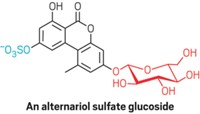Advertisement
Grab your lab coat. Let's get started
Welcome!
Welcome!
Create an account below to get 6 C&EN articles per month, receive newsletters and more - all free.
It seems this is your first time logging in online. Please enter the following information to continue.
As an ACS member you automatically get access to this site. All we need is few more details to create your reading experience.
Not you? Sign in with a different account.
Not you? Sign in with a different account.
ERROR 1
ERROR 1
ERROR 2
ERROR 2
ERROR 2
ERROR 2
ERROR 2
Password and Confirm password must match.
If you have an ACS member number, please enter it here so we can link this account to your membership. (optional)
ERROR 2
ACS values your privacy. By submitting your information, you are gaining access to C&EN and subscribing to our weekly newsletter. We use the information you provide to make your reading experience better, and we will never sell your data to third party members.
Environment
Scientists Plumb Vegetables' Secrets
Researchers learn how bland old celery perks up broth flavor and how broccoli aids heart health
by Sophie L. Rovner
January 29, 2008

If you're preparing broth, be sure to toss in some celery. Its phthalides add pleasing complexity to the soup's flavor, according to Japanese researchers. And while your bouillon simmers, you might want to munch on broccoli. A U.S. research team says that vegetable's constituents limit heart damage in rats.
In an article detailing their work (J. Agric. Food Chem. 2008, 56, 512), food chemist Kikue Kubota at Ochanomizu University, in Tokyo, and colleagues note that celery ???has a characteristic spicy odor that turns to a sweet spicy note after boiling??? and is considered important for making bouillon. They identified three volatile phthalides—which themselves have no taste—whose olfactory contributions are responsible for enhancing the complex flavor of bouillon.
Meanwhile, Dipak K. Das and colleagues in the Cardiovascular Research Center at the University of Connecticut School of Medicine may have discovered one reason broccoli is so good for you. They report that the hearty vegetable activates thioredoxins and other proteins that protect the heart from oxidative damage and cell death (J. Agric. Food Chem. 2008, 56, 609).





Join the conversation
Contact the reporter
Submit a Letter to the Editor for publication
Engage with us on Twitter